关于VSM性能优化的思考🤔
Update 一下
跟室友讨论了一下 才发现有一些我以为很理所应当的点 才是优化的关键 (当然你们看我的 code 应该也能看出来 只是没点明白)
Optimize Point
- 不要试图去开大数据量的二维数组
- 一旦你初始化一个 3k✖️3k 的数据 你就会发现即使你只是读一下这个数组就会死慢死慢 还要频繁写入 效率可想而知
- 正确的姿势 应该是开一个一维的数组 然后每次存入一个 3k 数组的 Index
- 这么做是有道理的
- 首先实际数组 相对于动态开起来的
- 然后我们存在一维数组里的 实际上是 Index 值 这个会快很多
- 而且存进去的数组 是
Immutable-不(可)更改的 不需要 update 这个又会快很多 - 于是乎 这就是第一个
bonus Ponit
- 要用
Numpy的矩阵乘法 🙅 不要手写
- 虽然 我不知道它的内部实现机理 但真的很快
- 快到瞠目结舌 3k✖️6w 的矩阵相乘 10s 不到
- 这 我 3k✖️3k 遍历一遍就要 1min
- 可以考虑动态对齐词矩阵 降低词向量维数
- 目前我们是按所有文章中词向量维数为所有词向量的长度 大约 6w 维
- 如果按每个 article 为粒度 用动态对齐的方式 可以省很多空间
- 我之所以没这么干
- 因为我 tf 做了 smooth 操作 所有零项 不能简单的补零 复杂度较高
- 然后动态补零 就不能用
numpy的矩阵乘法 就很伤
- 另外就是通过开线程实现加速操作
- 友情提示 内存小的 可能会比较尴尬
- 在 docker 里试了一下 在矩阵相乘的时候中间状态 把内存撑爆了 直接 killed 了
剩下的看代码应该就会懂得 (这样应该干货多了吧)
然后吕同学提的预处理的问题 挺好的 词性确实很重要
做了个小统计发现整个词袋里面有 5477 个词有多重词性的 高等词还有 8 个词性 so 呢
根据蔡同学的思路 把词频小于 10 的词过滤掉
26s 就跑完了 但感觉 信息丢失的有点多
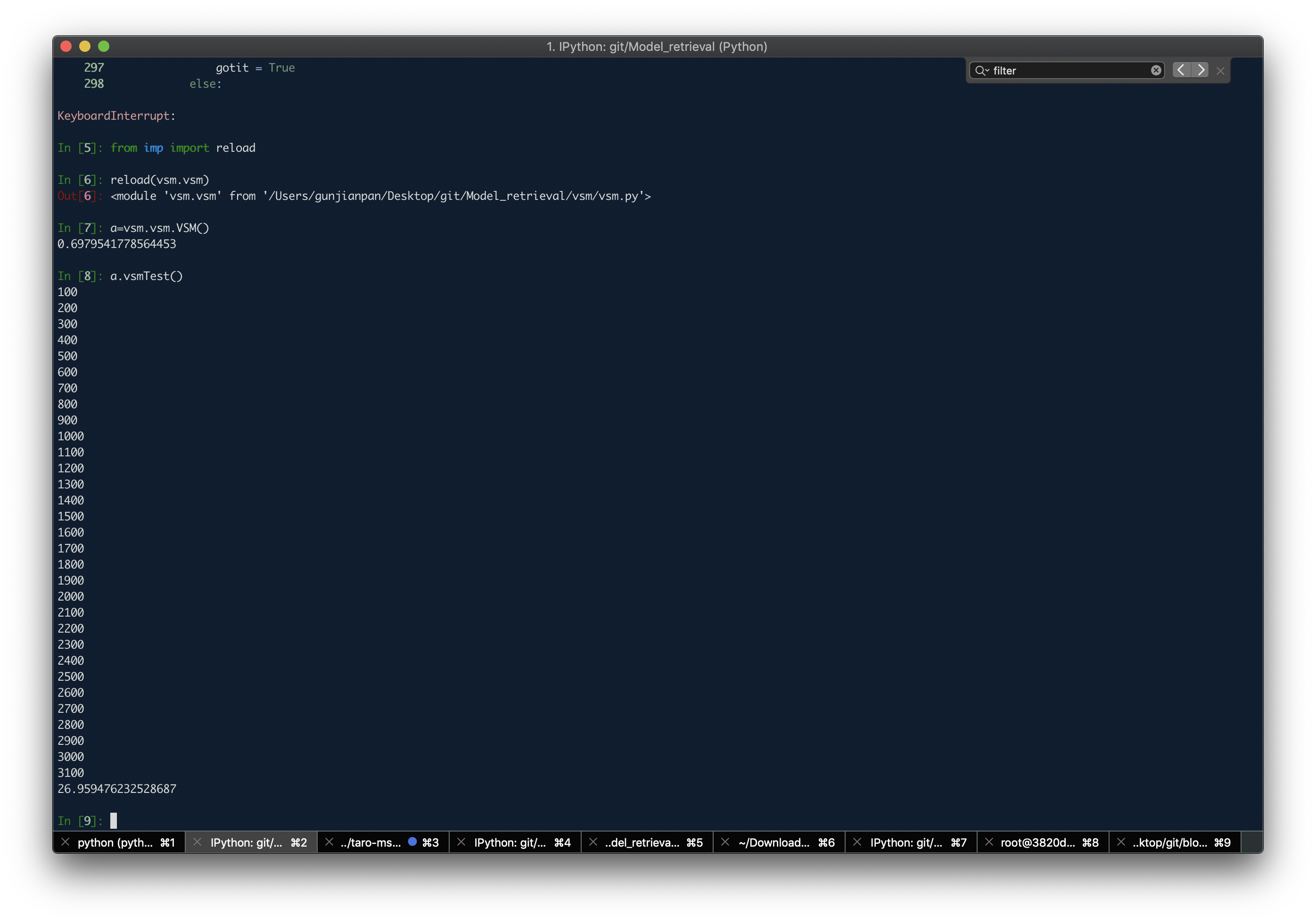
VSM 很简单 但 hand write 起来 还是会有一些问题的
Preproccess
额 我们拿到的文本 虽然已经分词好了 但 并不是很能用
所以我们需要预处理
对于这种文本的预处理 shell 是最好的选择 (不是 php 手动滑稽)
shell 或者说 bash 脚本 性能对于这种文本处理基本上是秒级的
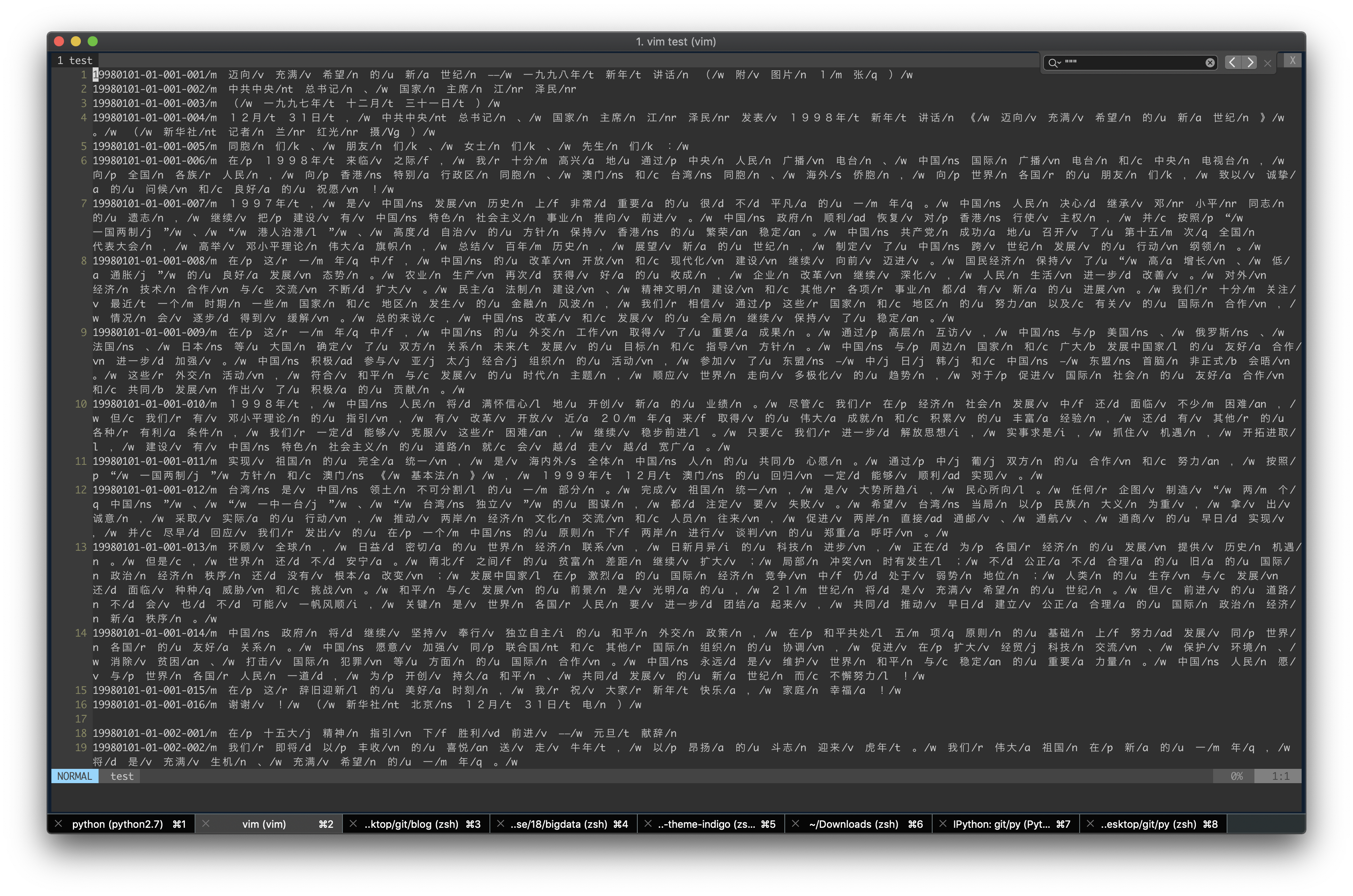
可以看出好像前面 15 位的 代表 ArticleId 属于同一个文章
然后虽然分词过了 但有很多分隔符什么/ n, / c, / vn
本来我是想枚举的 但发现 好像 26 个字母都有 真的恐怖
然后不只有这些 还有中文标点 什么《》, ()的 也得去掉
然后整理一下就变成了
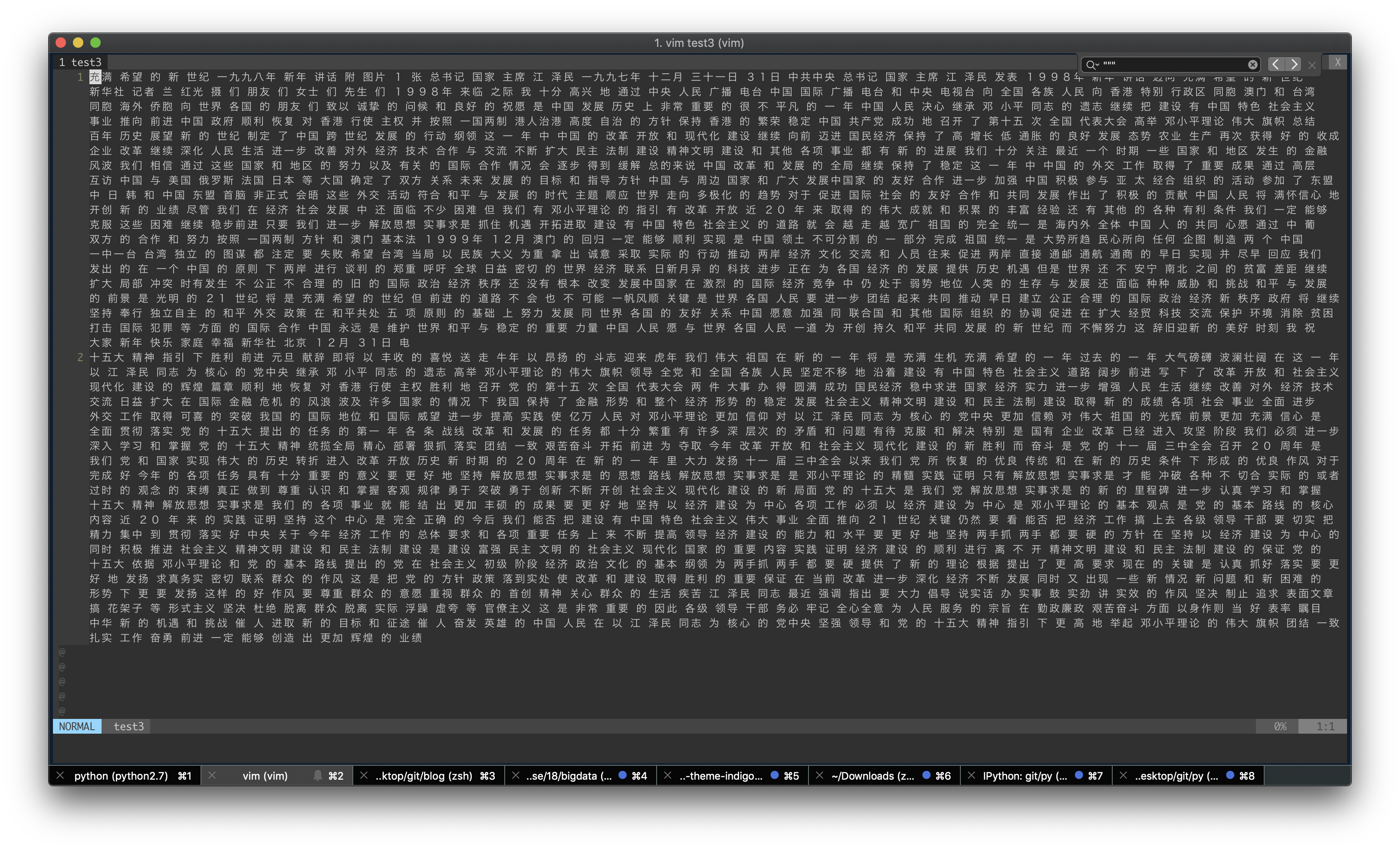
性能方面 虽然没打时间 但基本上秒级
附上 code
# @Author: gunjianpan
# @Date: 2018-11-11 19:11:19
# @Last Modified by: gunjianpan
# @Last Modified time: 2018-11-11 20:26:47
cp data.txt test
# Set Tag Where File End
echo '1' >> test
# According article to jonit string
# @1: Remove blank lines
# @2: split by ‘/x’ or ‘/xx’
# then, jonit string until into another article(recognition by $1)
# @return: Plain text which one plain one artile
sed - n '/./p' test | awk '{split($0,a,"/. |/.. ");b="";for(i=3;i<length(a);i++){b=b" "a[i];}if(!last||last==substr($1,0,15)){total=total""b;}else{print substr(total,2);total=b;}last=substr($1,0,15)}' >> test2
# Remove Chinese punctuation
# @1: replace punctuation Chinese or English to blank
# @2: replace mutil-blank to one-blank
sed 's/[;:,。()?!《》【】{}“”、——;:,.()?!_]/ /g' test2 | sed 's/[ ][ ]*/ /g' >> test3
2
3
4
5
6
7
8
9
10
11
12
13
14
15
16
17
18
19
20
VSM
VSM 分三步
- 词长度对齐
- TF - IDF(考虑平滑, similarity 方式)
- one by one calaulate
思路很简单
我一开始觉得 TF - IDF 计算需要针对每个(article1, article2)进行计算
因为需要对齐 而且最关键要平滑
如果有个词 article1 没有,article2 也没有 如何计算 tf 的时候因为进行平滑处理 就会占一定比例 这对于那些高词频的 word 就不太友好
于是我第一版 就 一个个遍历过去 3100✖️3100 (见VSM.vsmCalculate())
看起来 没啥 乘起来就是 500w
初始化数组就要 1min
于是开了两级多线程
- 每行为一个线程
- 每行里面每组 similarity 计算为一个线程
但效果很差 因为那么多个线程争夺写一个 3100✖️3100 的 numpy.Array 出现了写阻塞现象
通过 Activity Monitor 观察 实际上线程数只有 5.6 左右
把 numpy.Array 换成 list 发现效率高了一点 还是不行
于是 想能不能不同时争夺写一个 list 直接每一行维护一个 list 直接写文件
发现效率提高很多 基本上 1s 能处理 500 个数据
那 500w 需要 3h+
于是牺牲一下精确度 先按词袋里所有词 对齐词向量(见VSM.vsmTest())
如何先生成 3100 篇文章的词向量组(tf - idf 之后)
再做一次 A.dot(A.T)就可以得到结果
实际效果总耗时 215s 约 3min 效果较好
然后一次误输出 发现内存中的中间状态数组已经到了 4.3G
额 内存小的同学可能就比较尴尬了
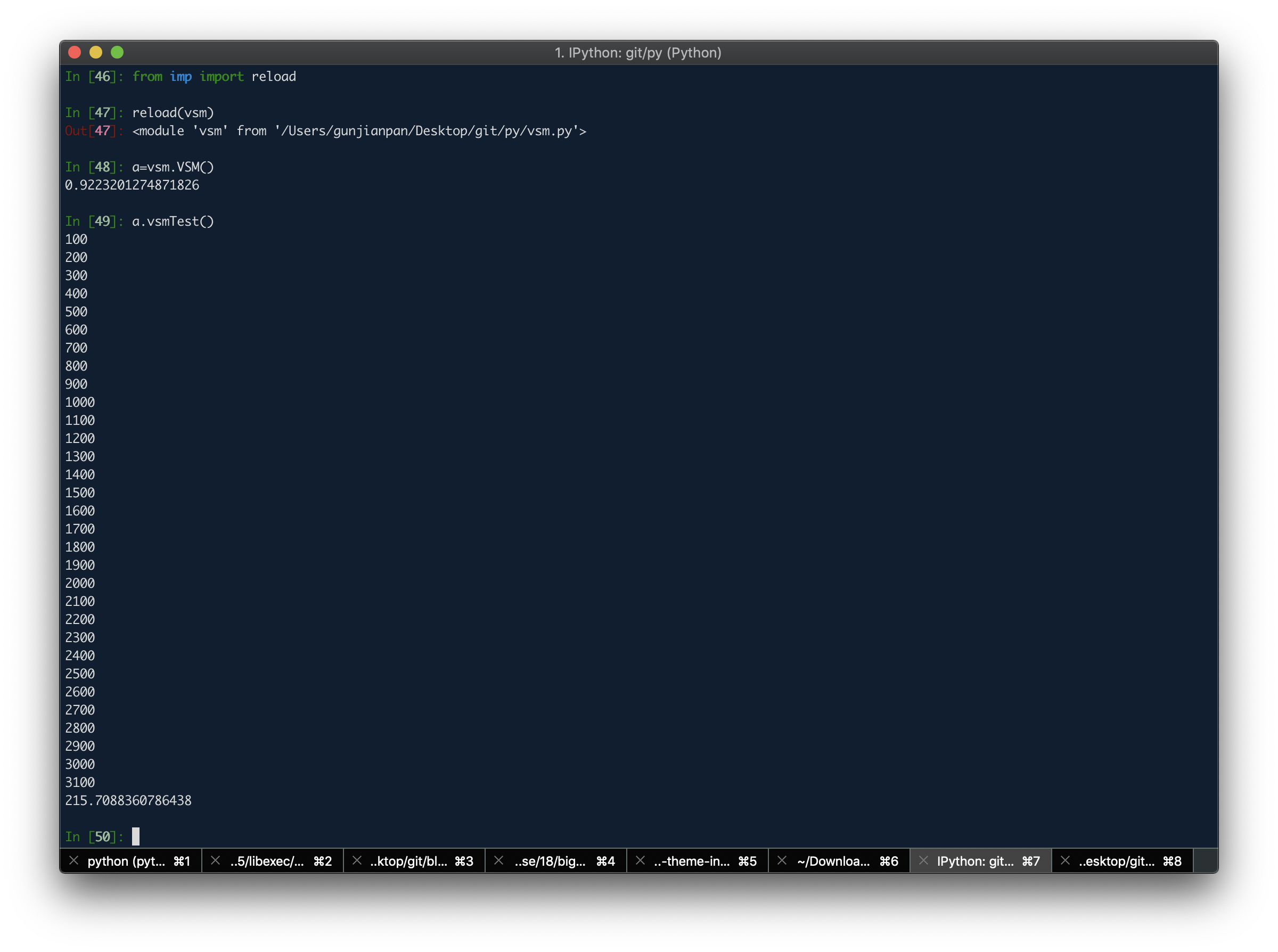
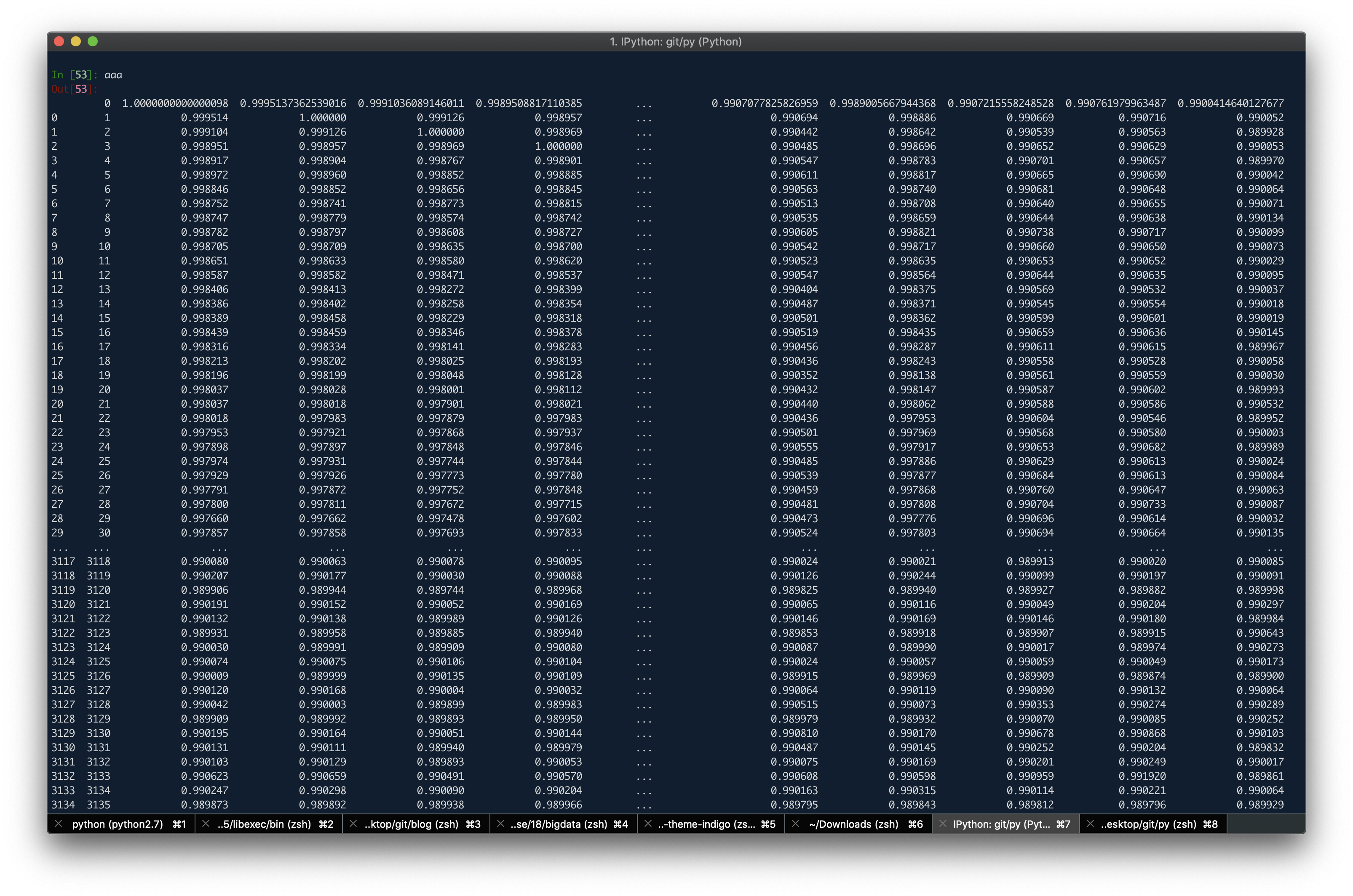
关于隐语义等考完试再来弄
之前写过一篇关于时序分析相关内容RNN 家族的 blog
# -*- coding: utf-8 -*-
# @Author: gunjianpan
# @Date: 2018-11-11 20:27:41
# @Last Modified by: gunjianpan
# @Last Modified time: 2018-11-13 01:07:16
import math
import numpy as np
import pandas as pd
import threading
import time
class VSM():
"""
handle write vsm 🙉
"""
def __init__(self):
self.articleMaps = []
self.articleNum = 0
self.process = 0
self.resultArray = []
self.wordMaps = {}
self.preData()
def preData(self):
"""
data prepare
"""
begin_time()
file_d = open('test3', 'r')
articles = file_d.readlines()
threadings = []
self.articleNum = len(articles)
self.articleMaps = [None for i in range(self.articleNum)]
self.resultArray = [None for i in range(self.articleNum)]
for index in range(self.articleNum):
work = threading.Thread(target=self.preDataBasic, args=(
articles[index].strip('\n').rstrip(), index,))
threadings.append(work)
for work in threadings:
work.start()
for work in threadings:
work.join()
end_time()
def preDataBasic(self, article, articleId):
"""
prepare data basic in Threading
@param article: article string
@param articleId: article id
"""
words = article.split(' ')
wordMap = {}
for word in words:
if word in wordMap:
wordMap[word] = wordMap[word] + 1
else:
wordMap[word] = 1
for word in wordMap:
if word in self.wordMaps:
self.wordMaps[word] = self.wordMaps[word] + 1
else:
self.wordMaps[word] = 1
self.articleMaps[articleId] = wordMap
def tfidfTest(self, wordMap):
"""
calculate tdidf value
td use Augmented Frequency 0.5 + 0.5 * fre/maxFre
"""
wordlist = [wordMap[i] for i in [*wordMap]]
maxFrequency = max(wordlist)
tf = np.array([0.5 + 0.5 * index / maxFrequency for index in wordlist])
idf = np.array([math.log(self.articleNum / self.wordMaps[word])
for word in [*wordMap]])
tfidf = tf * idf
return tfidf
def tfidf(self, wordMap):
"""
calculate tdidf value
td use Augmented Frequency 0.5 + 0.5 * fre/maxFre
"""
wordlist = [wordMap[i] for i in [*wordMap]]
maxFrequency = max(wordlist)
tf = np.array([0.5 + 0.5 * index / maxFrequency for index in wordlist])
idf = np.array([math.log(self.articleNum / (1 + self.wordMaps[word]))
for word in [*wordMap]])
tfidf = tf * idf
return tfidf / np.linalg.norm(tfidf, ord=2)
def preSimilarity(self, wordMap, index):
"""
align map and then calculate one tfidf
"""
tempMap = {
index: wordMap[index] if index in wordMap else 0 for index in self.wordMaps}
preMap = {**wordMap, **tempMap}
self.resultArray[index] = self.tfidf(preMap)
self.process += 1
if not self.process % 100:
print(self.process)
def vsmTest(self):
"""
once to calaulate vsm
"""
begin_time()
threadings = []
for index in range(self.articleNum):
work = threading.Thread(target=self.preSimilarity, args=(
self.articleMaps[index], index,))
threadings.append(work)
for work in threadings:
work.start()
for work in threadings:
work.join()
tempMatrix = np.array(self.resultArray)
result = tempMatrix.dot(tempMatrix.T)
df = pd.DataFrame(result)
df.to_csv("vsm1.csv", header=False)
end_time()
def preSimilarityTest(self, wordMap1, wordMap2):
"""
align map and then calculate one tfidf
"""
tempMap1 = {
index: wordMap1[index] if index in wordMap1 else 0 for index in wordMap2}
preMap1 = {**wordMap1, **tempMap1}
return self.tfidfTest(preMap1)
def similarity(self, wordMap1, wordMap2, types):
"""
calculate similarity by cos distance
@Param types: distance calculate type
=0 Cos Distance
=1 Chebyshev Distance
=2 Manhattan Distance
=3 Euclidean Distance
"""
tfidf1 = self.preSimilarityTest(wordMap1, wordMap2)
tfidf2 = self.preSimilarityTest(wordMap2, wordMap1)
if not types:
return np.dot(tfidf1, tfidf2) / (np.linalg.norm(tfidf1, ord=2) * np.linalg.norm(tfidf2, ord=2))
elif types == 1:
return np.abs(tfidf1 - tfidf2).max()
elif types == 2:
return np.sum(np.abs(tfidf1 - tfidf2))
elif types == 3:
return np.linalg.norm(tfidf1 - tfidf2)
else:
return np.shape(np.nonzero(tfidf1 - tfidf2)[0])[0]
def vsmCalculate(self):
"""
calculate vsm
"""
#: todo write block
begin_time()
threadings = []
for index1 in range(self.articleNum):
work = threading.Thread(target=self.vsmThread, args=(index1,))
threadings.append(work)
for work in threadings:
work.start()
for work in threadings:
work.join()
end_time()
def vsmThread(self, index1):
"""
vsm threading
"""
nowarticle = self.articleMaps[index1]
tempResult = []
for index2 in range(index1, self.articleNum):
tempResult.append(self.vsmPre(
nowarticle, self.articleMaps[index2]))
df = pd.DataFrame({index1: tempResult})
df.to_csv('vsm.csv', mode='a', header=False)
def vsmPre(self, wordMap1, wordMap2):
"""
load data to result
prevent read block
"""
self.process += 1
if not self.process % 100:
print(self.process)
return self.similarity(wordMap1, wordMap2, 0)
start = 0
def begin_time():
global start
start = time.time()
def end_time():
print(time.time() - start)
2
3
4
5
6
7
8
9
10
11
12
13
14
15
16
17
18
19
20
21
22
23
24
25
26
27
28
29
30
31
32
33
34
35
36
37
38
39
40
41
42
43
44
45
46
47
48
49
50
51
52
53
54
55
56
57
58
59
60
61
62
63
64
65
66
67
68
69
70
71
72
73
74
75
76
77
78
79
80
81
82
83
84
85
86
87
88
89
90
91
92
93
94
95
96
97
98
99
100
101
102
103
104
105
106
107
108
109
110
111
112
113
114
115
116
117
118
119
120
121
122
123
124
125
126
127
128
129
130
131
132
133
134
135
136
137
138
139
140
141
142
143
144
145
146
147
148
149
150
151
152
153
154
155
156
157
158
159
160
161
162
163
164
165
166
167
168
169
170
171
172
173
174
175
176
177
178
179
180
181
182
183
184
185
186
187
188
189
190
191
192
193
194
195
196
197
198
199
200
201
202
203
204
205
206
207
208
209
祝大家考试顺利 🙏